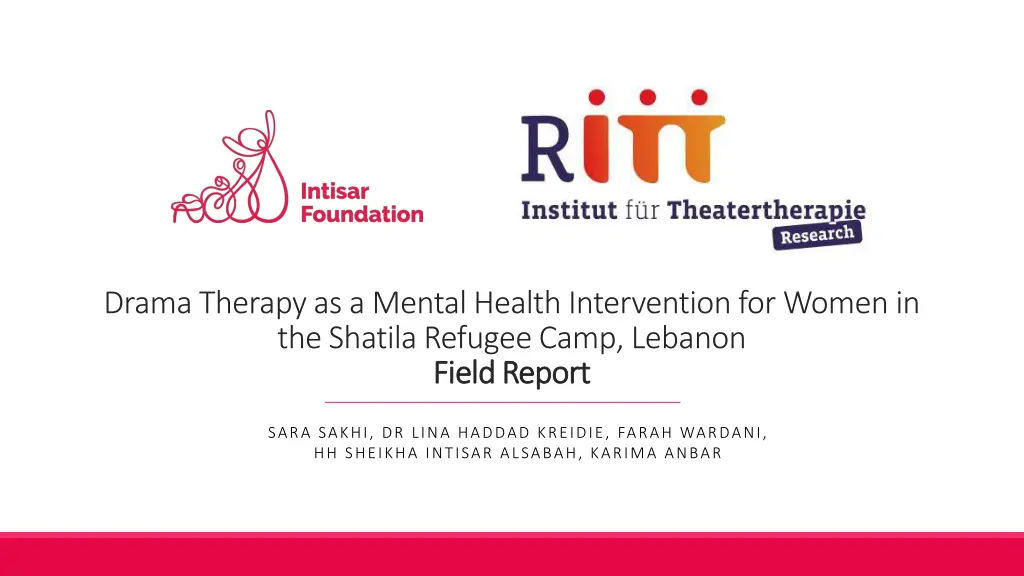
Drama Therapy as a Mental Health Intervention for Women in Shatila Refugee Camp, Lebanon
Discover the impact of drama therapy as a mental health intervention for women in the challenging environment of Shatila Refugee Camp, addressing psychological stress and limited resources through innovative approaches.
Download Presentation

Please find below an Image/Link to download the presentation.
The content on the website is provided AS IS for your information and personal use only. It may not be sold, licensed, or shared on other websites without obtaining consent from the author. If you encounter any issues during the download, it is possible that the publisher has removed the file from their server.
You are allowed to download the files provided on this website for personal or commercial use, subject to the condition that they are used lawfully. All files are the property of their respective owners.
The content on the website is provided AS IS for your information and personal use only. It may not be sold, licensed, or shared on other websites without obtaining consent from the author.
E N D
Presentation Transcript
Drama Therapy as a Mental Health Intervention for Women in the Shatila Refugee Camp, Lebanon Field Report Field Report SARA SAKHI, DR LINA HADDAD KREIDIE, FARAH WARDANI, HH SHEIKHA INTISAR ALSABAH, KARIMA ANBAR
1 Introduction Introduction
1 Introduction and Background Shatila Camp & Refugee mental health 2 Dramatherapy Programme Overview 3 CONTENTS CONTENTS Implementation 4 5 Research and Key Findings 6 Conclusions
Introduction Context: Context: - Shatila Camp is the largest refugee camp in Lebanon. - Home to Palestinian and Syrian refugees facing harsh living conditions. - Refugees suffer from psychological stress due to war and postmigration issues. Problem: Problem: - Lack of mental healthcare resources and strong social stigma towards psychological interventions.
Background Palestinian Refugees: Palestinian Refugees: - Protracted refugee status, low socioeconomic status, restricted employment opportunities. - Limited access to education and healthcare. Syrian Refugees: Syrian Refugees: - Strained resources due to 2011 Syrian war. - Economic challenges and social discrimination. - Legal hurdles for residence and work.
2. Shatila Refugee Camp and Refugee Mental Health
Shatila Camp Conditions Living Conditions: Living Conditions: - Overcrowded and inadequate housing. - Historical violence (e.g., Sabra and Shatila massacre). - Lack of governmental authority and safety.
Mental Health Challenges - Pre- and post-migration trauma, generational trauma - High levels of mental disorders among refugees. - Limited access to specialized mental health care. - Stigma and financial barriers to seeking help.
3 Programme Overview
Drama Therapy Overview - HH Sheikha Intisar AlSabah founded Intisar Foundation in an effort to address the unmet mental health needs for women affected by war and trauma in the Arab world -Intisar Foundation started its field operations in 2018 after extensive mapping and research which led to dramatherapy being used as the main modality. o Group-based (community focused) o Little to no stigma, culturally sensitive o Holistic in its approach (use of body, voice, and movement in addition to emotional and cognitive work)
4 Implementation
Drama Therapy Program in Shatila Implementation: Implementation: - Conducted by Intisar Foundation between 2018 and 2019. -Included intensive (12 weekly sessions) and follow-up programs (12 monthly sessions). - Held within the camp in community centers, trusted NGOs - After agreements were established with partners, the social workers would conduct outreach and create groups
Phase 5: Dramatic Ritual Phase 4: Culminating Enactments Phase 3: Phase 2: Scene Work Phase 1: Dramatic Play Role Play Public or private performance, collection of Vignettes or a session that focuses on closure, celebrating accomplish- ments. Personal insight, memory recollection, open expression. Imagination, group solidarity, guided meditation. Rapport building, trust, personal disclosure. Theatre techniques, self- exploration, relaxation. Five-Phase Model by Rene Emunah, 1994
5 Research and Key Findings
Phase 1: Pre-Programme Interviews Obtained list Of Participants And Arranged Individual Interviews Collected Demographic Data And Group Profile Information Obtained Informed Consent And Ensured Anonymity Translated And Transcribed Interviews Phase 2: Focus Group Discussion Conducted halfway through the programme Discussed programme experiences and possible improvements Audio-recorded, translated, and transcribed discussion
Phase 3: Post-Programme Interviews Conducted within 2 weeks after the final sessions Open-ended questions to explore the programme's impact Ensured consent, anonymity, and audio-recording Translated and transcribed interviews Phase 4: Analysis of Findings Utilized interpretative phenomenological analysis Coded and refined transcripts to find common themes Clustered codes into themes and superordinate themes
Emotional Regulation Benefits of Movement and Exercise Findings Changes within the Family A Sense of Belonging
Emotional Regulation Our upbringing was very conservative and we were taught that showing emotions is not okay. Our upbringing was very conservative and we were taught that showing emotions is not okay. We had to keep everything buried inside us. It is shameful to cry, it is shameful to complain, it We had to keep everything buried inside us. It is shameful to cry, it is shameful to complain, it is shameful to confide in anyone because they will turn around and mock us. That made me is shameful to confide in anyone because they will turn around and mock us. That made me very paranoid about people's intentions. So, I always avoided talking about my feelings or my very paranoid about people's intentions. So, I always avoided talking about my feelings or my problems. But the sessions here taught me that it is okay to be expressive. I can and should problems. But the sessions here taught me that it is okay to be expressive. I can and should talk to my friends and my colleagues about what is bothering me. talk to my friends and my colleagues about what is bothering me.
Benefits of Movement and Exercise When we first started the sessions, I was stiff, I could not move easily. But when I let my mind When we first started the sessions, I was stiff, I could not move easily. But when I let my mind wander with the music, it felt like I was flying . wander with the music, it felt like I was flying .
A Sense of Belonging Frankly, I do not have many friends. I always felt that I bring people down because I constantly Frankly, I do not have many friends. I always felt that I bring people down because I constantly felt depressed. As the sessions went on, I found myself more comfortable with the women felt depressed. As the sessions went on, I found myself more comfortable with the women around me because they were open, and this helped me become more open. We were able around me because they were open, and this helped me become more open. We were able to talk without fear or restrictions, we were in a sacred place together. Usually, we would to talk without fear or restrictions, we were in a sacred place together. Usually, we would whisper our secrets, but not in the sessions. whisper our secrets, but not in the sessions.
Changes within the Family My daughters used to be scared of me. My daughters used to be scared of me. I used to yell at them and beat them over the I used to yell at them and beat them over the smallest thing, smallest thing, it was living in a constant state of stress that made me so irritable. it was living in a constant state of stress that made me so irritable. The drama The drama therapy sessions were a chance to expel all the negative energy and come home feeling light. therapy sessions were a chance to expel all the negative energy and come home feeling light. This allowed me to be more understanding with my daughters, This allowed me to be more understanding with my daughters, as I as I realised realised that violence that violence would make them hate me and less responsive to me. would make them hate me and less responsive to me. Many things have changed, Many things have changed, we do not we do not yell anymore, yell anymore, the girls finish their homework quicker and help me around the house without the girls finish their homework quicker and help me around the house without causing a fuss. causing a fuss.
6 Conclusion
LIMITATIONS STRENGTHENS The results do not offer a statistical analysis of the program's impact but rely solely on personal narratives and experiences. The study offered insights from a non-Western perspective The study showed the malleability and flexibility of non-traditional approaches to mental health and highlighted the possibilities for future endeavours in poverty-stricken and low-resource contexts Despite using standardized questions to reduce bias, both researcher and participant biases may still be present. Some participants might have withheld negative feedback due to friendliness or social desirability biases. The approach of DT proved to align with the needs of the population, beyond pathologization






















